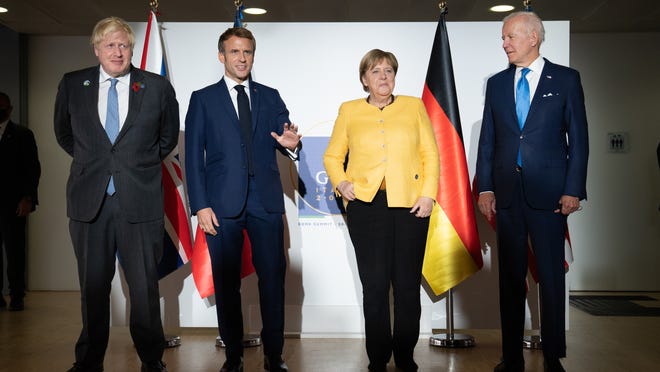
GLASGOW – World leaders gathered here Monday for a high-stakes United Nations' COP26 climate summit, where they are discussing ways to address the warming planet, even as many countries, including the U.S., are falling short on emissions-reduction targets and struggling to enact domestic climate-change legislation.
The COP26 summit runs until Nov. 12, with thousands of delegates, diplomats and activists holding talks on how to limit the increase in global temperatures to below 2 degrees Celsius above pre-industrial levels, but preferably to 1.5 degrees.
But the next 48 hours will see global leaders facing pressure to turn political pledges to tackle climate change into concrete actions. Scotland's capital is hosting the summit amid intensifying concern from scientists that nations are not doing enough to limit greenhouse gas emissions that have caused an average rise in global temperatures.
Urgency pervades COP26 climate summit:U.S. grapples with environmental justice
A United Nations report issued in late October concluded current pledges to rein in global warming will mean the planet would warm by 2.7 degrees Celsius, above preindustrial levels, by the end of the century. Such an outcome would mean more destructive floods, wildfires, droughts, heatwaves, animal species extinctions, and numerous other negative climate impacts from public health to forced migration.
"Humanity has long since run down the clock on climate change," British Prime Minister Boris Johnson said as the World Leaders Summit part of COP26 got underway.
"It’s one minute to midnight and we need to act now. If we don’t get serious about climate change today, it will be too late for our children to do so tomorrow."
During opening remarks to the conference, UN Secretary General Antonio Guterres said it was "an illusion to think we are track to turning the world around." He urged the developed world and emerging countries to form coalitions to create technological solutions to make sure that the 1.5 degrees Celsius target was met.
"The COVID-19 pandemic has shown us just how devastating a global, cross-border threat can be," said Britain's Prince Charles. "Climate change and biodiversity loss are no different – in fact, they pose an even greater existential threat, to the extent that we have to put ourselves on what might be called a war-like footing."
COP26: U.S. climate credibility in question at UN summit with Biden's agenda in flux
President Joe Biden said in an address to the conference that Glasgow should be the start of a decade of ambition to fight climate change. According to Biden's National Climate Advisor Gina McCarthy the president will spend his two days in Glasgow emphasizing how "within three decades, the U.S. can meet our global climate commitments by decarbonizing the power sector, electrifying transportation and buildings, transforming industry, reducing non-CO2 emissions, and reinvigorating our natural lands" with a view to achieving net-zero greenhouse gas emissions by 2050.
"None of us can escape the worst that is yet to come if we fail to seize the moment," Biden said, noting the number of natural disasters in the U.S. and elsewhere this year.
However, Biden arrives in Glasgow with one hand effectively tied behind his back because Democratic divisions in Congress have meant that he has been unable to pass a $1.75 trillion spending package that featured $555 billion in climate provisions.
Further adding to the gloom, a weekend G-20 summit in Rome ended without any specific plan to halt international financing of coal-generated power while China, the world's largest emitter of greenhouse gases, has not sent its leader to the confab. Russia's President Vladimir Putin is also not attending the summit in person.
What is COP26?:Your quick guide to UN climate change summit in Glasgow
"We expected much more from G-20 countries, responsible for 78% of global greenhouse gas emissions," said Manuel Pulgar-Vidal, a former environment minister in Peru's government and now with the World Wildlife Fund conservation organization.
After national leaders deliver brief statements to COP26 on Monday and Tuesday, each day of the conference will be devoted to a specific climate theme such as forests, finance, gender, science, cities, adaptation and loss and damage.
The year's summit marks the 26th time world leaders have gathered to try to limit global warming. The conference was postponed for a year due to the coronavirus pandemic.
The meeting has been widely hailed as the most significant climate-related summit since the 2015 Paris accords, an agreement that former President Donald Trump pulled the U.S. out of but which Biden quickly re-entered on the first day of his presidency.
Contributing: Courtney Subramanian
Source link








